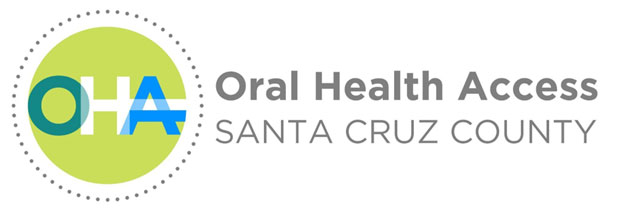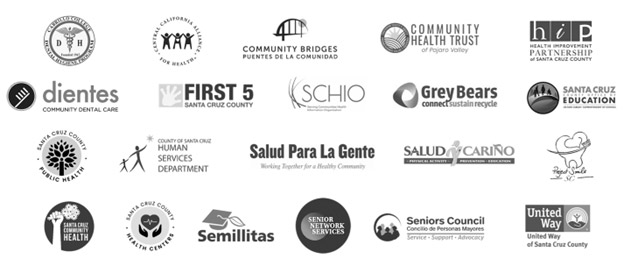
Healthy Smiles, the Local Oral Health Program (LOHP) of Santa Cruz County, is dedicated to improving the health and well-being of our community through oral health education, disease prevention, community-clinical linkages and surveillance of health data. Healthy Smiles serves as a hub for advancing oral health efforts throughout the County to decrease disparities, while increasing equitable access to oral health care and education for a thriving community with healthy smiles throughout the lifespan.
Healthy Smiles provides Oral Health education, training and resources for, but not limited to, Medi-Cal members, benefits rep trainees, those who are pregnant, children under five years old, school staff, home visiting programs, early education programs and more.
For more information, to request oral health education materials, or to schedule trainings and events send us a comment.
Healthy Smiles is supported by the California Department of Public Health, Office of Oral Health under the statewide grant initiative, Moving California Oral Health Forward 2022-2027, which includes the following objectives that are envisioned to by achieved by June 30, 2027:
Open to See the Objectives
- Objective 1: establish or sustain program infrastructure, partnerships, and processes to ensure implementation and evaluation of the Work Plan.
- Needs Assessment, Community Health Improvement Plan, Evaluation Plan
- Objective 2: implement evidence-based programs to achieve California Oral Health Plan objectives.
- Community Clinical Linkages, School-based/Linked Dental Programs and Fluoride
- Objective 3: work with partners to promote oral health by developing and implementing prevention and health care policies and guidelines for programs, health care providers, and institutional settings (e.g., schools) including integration of oral health care and overall health care.
- Kindergarten Oral Health Assessments and Key Partnerships
- Objective 4: address common risk factors for oral diseases and chronic diseases, including tobacco and sugar consumption, and promote protective factors that will reduce disease burden.
- Tobacco Cessation and Sugar-sweetened Beverage Reduction
How is Healthy Smiles Funded? In 2016, California passed Proposition 56, the California Healthcare, Research and Prevention Tobacco Tax Act. Oral Health grant funding from Prop 56 revenue is distributed to local oral health programs by the California Department of Public Health.
Oral Health Access (OHA)Santa Cruz County

Serving as the hub for oral health, the Local Oral Health Program (Healthy Smiles) connects key stakeholders in our community to strategically enhance our collective impact by supporting the coordination of the Oral Health Access (OHA) Santa Cruz County. Oral Health Access was created in 2016 by Dientes Community Dental to address the oral health needs of Santa Cruz County residents in response to the findings of the Oral Health Needs Assessment of 2016.
Today, OHA continues to lead equitable, data-driven oral health efforts countywide, with over 25 community partners.

For more information about OHA, visit www.oralhealthscc.org.
More information about OHA’s 2024-2028 Strategic Plan Goals and Metrics can be found on our DataShare Progress Page at:

This platform provides a comprehensive database of Santa Cruz County residents' well-being, making it an invaluable resource for local collaborative programs, initiatives, agencies and organizations that aim to increase equity and achieve specific well-being goals in the area. The page focuses on oral health population data trends, comparing them to local, state and national data, to provide an overview analysis of oral health outcomes by age, race and ethnicity, insurance type and pregnancy.
Need help finding an affordable dentist?
- List of Medi-Cal dentists in Santa Cruz County accepting new patients
- Dientes Community Dental Care (Accepts Medi-Cal)
- Live Oak: 831-276-7010,1500 Capitola Road, Santa Cruz
- Santa Cruz: 831-464-5409, 1830 Commercial Way, Santa Cruz
- Watsonville: 831-621-2560, 1430 Freedom Blvd, Suite C, Watsonville
- Santa Cruz: 831-464 – 5411, 100 Pioneer Street, Suite D, Santa Cruz
- Salud Para La Gente (Accepts Medi-Cal)
- 831-728-0222 - Low-cost dental services
- Cabrillo College Dental Hygiene Clinic (No insurance accepted- cash or check only)
- 831-479-6431 - Low-cost dental services